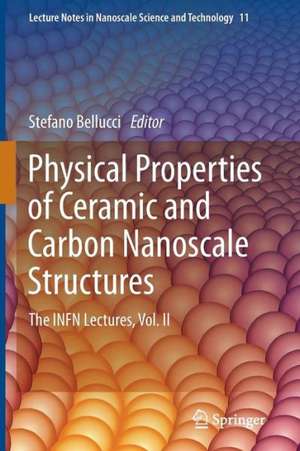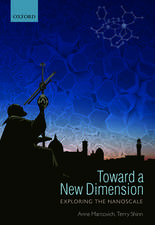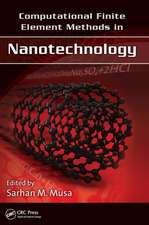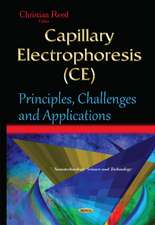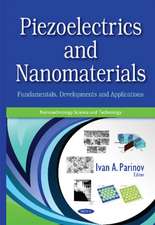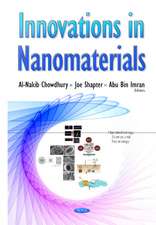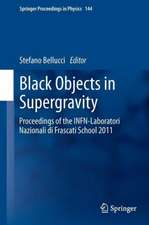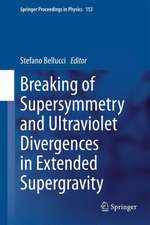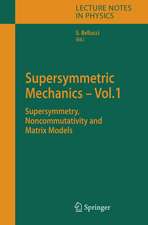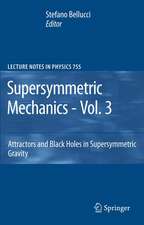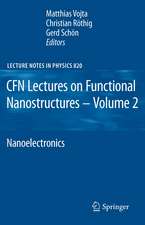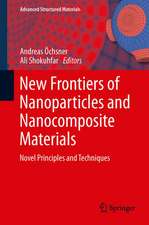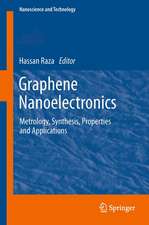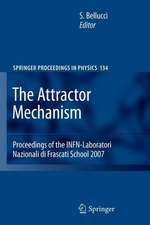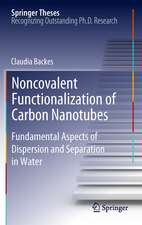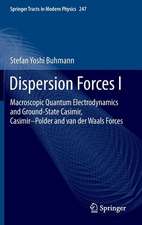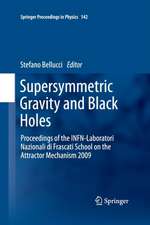Physical Properties of Ceramic and Carbon Nanoscale Structures: The INFN Lectures, Vol. II: Lecture Notes in Nanoscale Science and Technology, cartea 11
Editat de Stefano Belluccien Limba Engleză Paperback – 21 apr 2013
| Toate formatele și edițiile | Preț | Express |
|---|---|---|
| Paperback (1) | 636.30 lei 6-8 săpt. | |
| Springer Berlin, Heidelberg – 21 apr 2013 | 636.30 lei 6-8 săpt. | |
| Hardback (1) | 641.53 lei 6-8 săpt. | |
| Springer Berlin, Heidelberg – 2 mar 2011 | 641.53 lei 6-8 săpt. |
Din seria Lecture Notes in Nanoscale Science and Technology
- 18%
 Preț: 971.01 lei
Preț: 971.01 lei - 18%
 Preț: 1115.46 lei
Preț: 1115.46 lei - 18%
 Preț: 956.81 lei
Preț: 956.81 lei - 15%
 Preț: 641.71 lei
Preț: 641.71 lei - 15%
 Preț: 639.59 lei
Preț: 639.59 lei - 18%
 Preț: 952.89 lei
Preț: 952.89 lei - 18%
 Preț: 960.78 lei
Preț: 960.78 lei - 15%
 Preț: 654.77 lei
Preț: 654.77 lei - 18%
 Preț: 959.98 lei
Preț: 959.98 lei - 15%
 Preț: 648.24 lei
Preț: 648.24 lei - 18%
 Preț: 956.57 lei
Preț: 956.57 lei - 15%
 Preț: 650.69 lei
Preț: 650.69 lei - 18%
 Preț: 949.55 lei
Preț: 949.55 lei - 18%
 Preț: 1003.38 lei
Preț: 1003.38 lei - 18%
 Preț: 955.08 lei
Preț: 955.08 lei - 15%
 Preț: 642.18 lei
Preț: 642.18 lei - 15%
 Preț: 652.81 lei
Preț: 652.81 lei - 18%
 Preț: 1000.87 lei
Preț: 1000.87 lei - 15%
 Preț: 698.80 lei
Preț: 698.80 lei - 18%
 Preț: 1002.61 lei
Preț: 1002.61 lei - 15%
 Preț: 649.06 lei
Preț: 649.06 lei - 18%
 Preț: 1109.16 lei
Preț: 1109.16 lei - 18%
 Preț: 892.90 lei
Preț: 892.90 lei - 18%
 Preț: 799.51 lei
Preț: 799.51 lei - 18%
 Preț: 1009.08 lei
Preț: 1009.08 lei - 18%
 Preț: 1120.37 lei
Preț: 1120.37 lei - 15%
 Preț: 641.71 lei
Preț: 641.71 lei - 18%
 Preț: 953.97 lei
Preț: 953.97 lei
Preț: 636.30 lei
Preț vechi: 748.59 lei
-15% Nou
Puncte Express: 954
Preț estimativ în valută:
121.77€ • 132.22$ • 102.29£
121.77€ • 132.22$ • 102.29£
Carte tipărită la comandă
Livrare economică 22 aprilie-06 mai
Preluare comenzi: 021 569.72.76
Specificații
ISBN-13: 9783642267291
ISBN-10: 3642267297
Pagini: 212
Ilustrații: XIV, 198 p.
Dimensiuni: 155 x 235 x 11 mm
Greutate: 0.3 kg
Ediția:2011
Editura: Springer Berlin, Heidelberg
Colecția Springer
Seria Lecture Notes in Nanoscale Science and Technology
Locul publicării:Berlin, Heidelberg, Germany
ISBN-10: 3642267297
Pagini: 212
Ilustrații: XIV, 198 p.
Dimensiuni: 155 x 235 x 11 mm
Greutate: 0.3 kg
Ediția:2011
Editura: Springer Berlin, Heidelberg
Colecția Springer
Seria Lecture Notes in Nanoscale Science and Technology
Locul publicării:Berlin, Heidelberg, Germany
Public țintă
ResearchCuprins
Preface.- Formation and Characterization of Carbon and Ceramic Nanostructures.- Transport Properties in Carbon Nanotubes.- Nanotribology of Spiderman.- Strength of Nanotubes and Megacables.- Physical Properties of Carbon Nanostructures: Graphene and Nanotubes.
Notă biografică
Dr. Stefano Bellucci Istituto Nazionale di Fisica Nucleare Laboratori Nazionale die Frascati Frascati Italy stefano.bellucci@lnf.infn.it
Textul de pe ultima copertă
This is the second volume in a series of books on selected topics in Nanoscale Science and Technology based on lectures given at the well-known INFN schools of the same name. The aim of this collection is to provide a reference corpus of suitable, introductory material to relevant subfields, as they mature over time, by gathering the significantly expanded and edited versions of tutorial lectures, given over the years by internationally known experts. The present set of notes stems in particular from the participation and dedication of prestigious lecturers, such as Andrzej Huczko, Nicola Pugno, Alexander Malesevic, Pasquale Onorato and Stefano Bellucci. All lectures were subsequently carefully edited and reworked, taking into account the extensive follow-up discussions. A tutorial lecture by Huczko et al. shows how a variety of carbon and ceramic nanostructures (nanotubes, nanowires, nanofibres, nanorods, and nanoencapsulates) have in particular great potential for improving our understanding of the fundamental concepts of the roles of both dimensionality and size on physical material properties . Bellucci and Onorato provide an extensive and tutorial review of the (quantum) transport properties in carbon nanotubes, encompassing a description of the electronic structure from graphene to single-wall nanotubes, as well as a discussion of experimental evidence of superconductivity in carbon nanotubes and the corresponding theoretical interpretation. In the first contribution by Pugno, new ideas on how to design futuristic self-cleaning, super-adhesive and releasable hierarchical smart materials are presented. He also reviews the mechanical strength of such nanotubes and megacables, with an eye to the visionary project of a carbon nanotube-based ‘space elevator megacable’. In his second contribution, Pugno outlines in detail the role on the fracture strength of thermodynamically unavoidable atomistic defects with different size and shape, both numerically andtheoretically, for nanotubes and nanotube bundles. Focusing on graphitic allotropes, the chapter by Bellucci and Malesevic aims to give a taste of the widespread implications carbon nanostructures have on research and applications, starting from an historical overview, followed by a discussion of the structure and physical properties of carbon nanotubes and graphene, in particular in the context of the several different synthesis techniques presently available.
Caracteristici
With contributions by international experts Focuses on selected, hot topics Tutorial style makes contributions suitable as Supplementary material for advanced courses Includes supplementary material: sn.pub/extras
